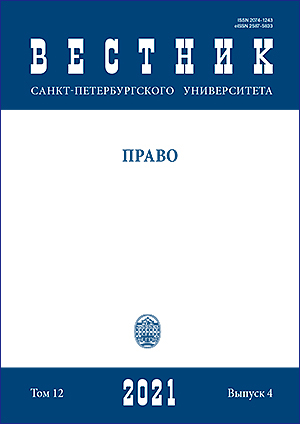Justice of punishment: Theoretical format and law enforcement practice
DOI:
https://doi.org/10.21638/spbu14.2021.411Abstract
The article analyzes the theoretical and law enforcement aspects of justice as a principle of punishability, the purpose of criminal punishment and the general commencement of sentencing. The primary focus is the issues of appointment and execution of punishment in the form of imprisonment. The problems of exemption from serving a sentence due to illness, penalization of drug crimes and compensatory punishment as the most relevant and illustrative facts of the existing relationship of justice with the principles of legality and humanism are analyzed in particular. Based on the study of the exclusion of persons sentenced to imprisonment, the boundaries of the fairness of individual sanctions of criminal law norms were studied, and the fairness of their application was evaluated in connection with the possibilities of modern justice, including the presence of discrete powers of the court in terms of assigning a specific type of correctional institution. It is noted that the discursive analysis of legal studies and empirical data reflects two main directions for the implementation of justice of punishment in its effective appointment and execution: on the one hand, the correction of the convicted person in a safe penitentiary process should be provided, and on the other, there are deontic expectations of the victim, society and the state from the impact of necessary and sufficient measures for criminal coercion. Observation of the results of the author’s research, data from judicial practice and statistics does not allow us to draw a conclusion about the absolutization of the justice of punishment in the considered aspects. However, a promising focus of the penitentiary process is the increased individualization and differentiation of punishment based on the nature and degree of public danger of the crime, as well as the importance of private-public interests.
Keywords:
justice, legality, humanism, principles of criminal law, punishment, imprisonment, regime
Downloads
References
Downloads
Published
How to Cite
Issue
Section
License
Articles of "Vestnik of Saint Petersburg University. Law" are open access distributed under the terms of the License Agreement with Saint Petersburg State University, which permits to the authors unrestricted distribution and self-archiving free of charge.






